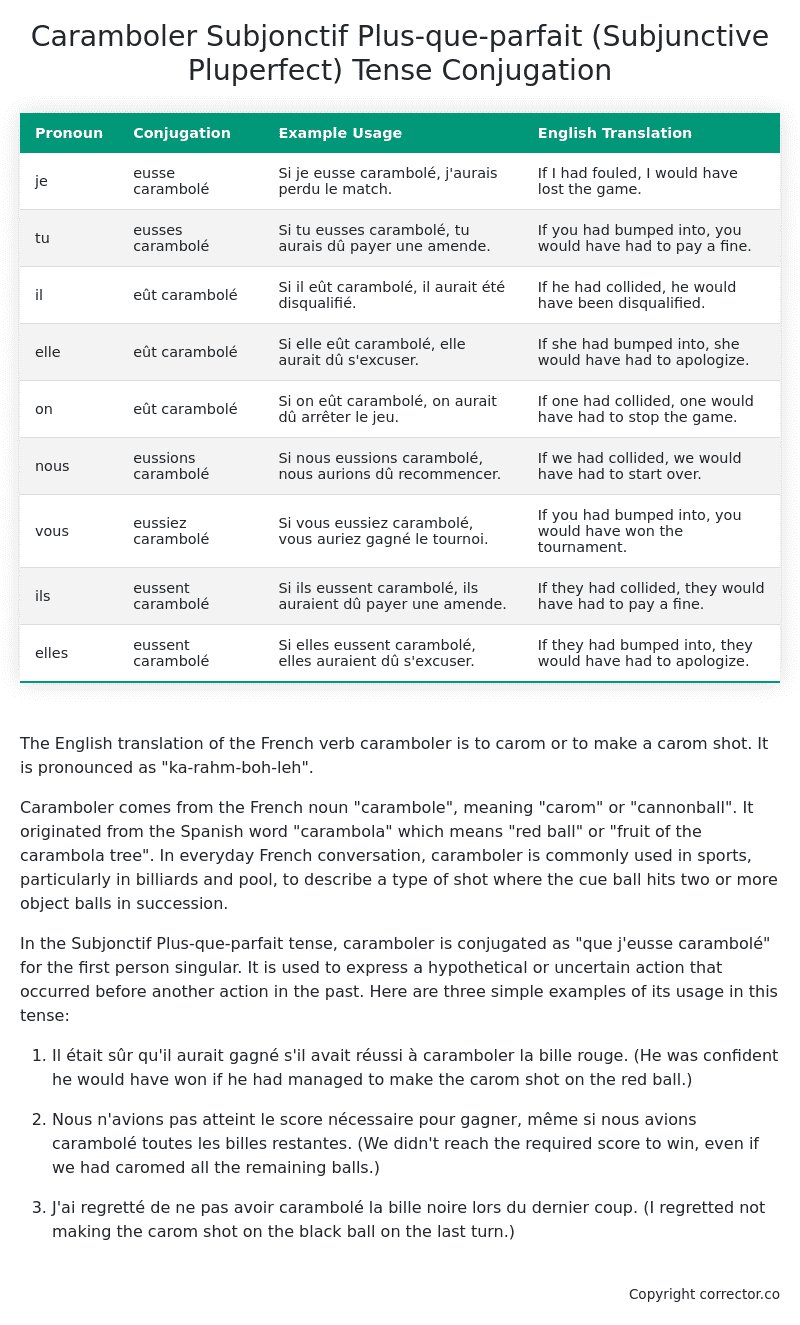Subjonctif Plus-que-parfait (Subjunctive Pluperfect) Tense Conjugation of the French Verb caramboler
Introduction to the verb caramboler
The English translation of the French verb caramboler is to carom or to make a carom shot. It is pronounced as “ka-rahm-boh-leh”.
Caramboler comes from the French noun “carambole”, meaning “carom” or “cannonball”. It originated from the Spanish word “carambola” which means “red ball” or “fruit of the carambola tree”. In everyday French conversation, caramboler is commonly used in sports, particularly in billiards and pool, to describe a type of shot where the cue ball hits two or more object balls in succession.
In the Subjonctif Plus-que-parfait tense, caramboler is conjugated as “que j’eusse carambolé” for the first person singular. It is used to express a hypothetical or uncertain action that occurred before another action in the past. Here are three simple examples of its usage in this tense:
-
Il était sûr qu’il aurait gagné s’il avait réussi à caramboler la bille rouge. (He was confident he would have won if he had managed to make the carom shot on the red ball.)
-
Nous n’avions pas atteint le score nécessaire pour gagner, même si nous avions carambolé toutes les billes restantes. (We didn’t reach the required score to win, even if we had caromed all the remaining balls.)
-
J’ai regretté de ne pas avoir carambolé la bille noire lors du dernier coup. (I regretted not making the carom shot on the black ball on the last turn.)
Table of the Subjonctif Plus-que-parfait (Subjunctive Pluperfect) Tense Conjugation of caramboler
| Pronoun | Conjugation | Example Usage | English Translation |
|---|---|---|---|
| je | eusse carambolé | Si je eusse carambolé, j’aurais perdu le match. | If I had fouled, I would have lost the game. |
| tu | eusses carambolé | Si tu eusses carambolé, tu aurais dû payer une amende. | If you had bumped into, you would have had to pay a fine. |
| il | eût carambolé | Si il eût carambolé, il aurait été disqualifié. | If he had collided, he would have been disqualified. |
| elle | eût carambolé | Si elle eût carambolé, elle aurait dû s’excuser. | If she had bumped into, she would have had to apologize. |
| on | eût carambolé | Si on eût carambolé, on aurait dû arrêter le jeu. | If one had collided, one would have had to stop the game. |
| nous | eussions carambolé | Si nous eussions carambolé, nous aurions dû recommencer. | If we had collided, we would have had to start over. |
| vous | eussiez carambolé | Si vous eussiez carambolé, vous auriez gagné le tournoi. | If you had bumped into, you would have won the tournament. |
| ils | eussent carambolé | Si ils eussent carambolé, ils auraient dû payer une amende. | If they had collided, they would have had to pay a fine. |
| elles | eussent carambolé | Si elles eussent carambolé, elles auraient dû s’excuser. | If they had bumped into, they would have had to apologize. |
Other Conjugations for Caramboler.
Le Present (Present Tense) Conjugation of the French Verb caramboler
Imparfait (Imperfect) Tense Conjugation of the French Verb caramboler
Passé Simple (Simple Past) Tense Conjugation of the French Verb caramboler
Passé Composé (Present Perfect) Tense Conjugation of the French Verb caramboler
Futur Simple (Simple Future) Tense Conjugation of the French Verb caramboler
Futur Proche (Near Future) Tense Conjugation of the French Verb caramboler
Plus-que-parfait (Pluperfect) Tense Conjugation of the French Verb caramboler
Passé Antérieur (Past Anterior) Tense Conjugation of the French Verb caramboler
Futur Antérieur (Future Anterior) Tense Conjugation of the French Verb caramboler
Subjonctif Présent (Subjunctive Present) Tense Conjugation of the French Verb caramboler
Subjonctif Passé (Subjunctive Past) Tense Conjugation of the French Verb caramboler
Subjonctif Imparfait (Subjunctive Imperfect) Tense Conjugation of the French Verb caramboler
Subjonctif Plus-que-parfait (Subjunctive Pluperfect) Tense Conjugation of the French Verb caramboler
Conditionnel Présent (Conditional Present) Tense Conjugation of the French Verb caramboler
Conditionnel Passé (Conditional Past) Tense Conjugation of the French Verb caramboler
L’impératif Présent (Imperative Present) Tense Conjugation of the French Verb caramboler
L’infinitif Présent (Infinitive Present) Tense Conjugation of the French Verb caramboler
(this article)
Struggling with French verbs or the language in general? Why not use our free French Grammar Checker – no registration required!
Get a FREE Download Study Sheet of this Conjugation 🔥
Simply right click the image below, click “save image” and get your free reference for the caramboler Subjonctif Plus-que-parfait tense conjugation!

Caramboler – About the French Subjonctif Plus-que-parfait (Subjunctive Pluperfect) Tense
Formation
Common Everyday Usage Patterns
Hypothetical Situations
Reported Speech
Doubt, Wishes, and Emotions
Interactions with Other Tenses
Present Subjunctive
Imperfect Subjunctive
Conditional
Summary
I hope you enjoyed this article on the verb caramboler. Still in a learning mood? Check out another TOTALLY random French verb conjugation!


